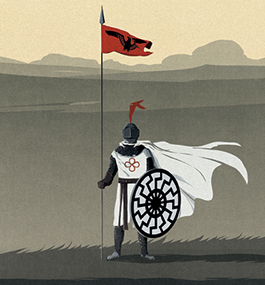Letters

On the front lines of medieval studies
It is good that Dorothy Kim is standing up for widening the field of medieval studies to include such modern issues as race, inclusivity and equity [“Jousting With the Alt-Right,” Winter 2019/2020]. No doubt there is much new ground to be explored. My only concern is her apparent in-your-face approach to enlightening her senior colleagues about this; some rethinking may be due. I am eager to read Kim’s forthcoming book, “Jewish/Christian Entanglements: Ancrene Wisse and Its Material Worlds.” I’m sure it will be most interesting.
Natalie G. Hall
Brandeis National Committee
San Fernando Valley Chapter, California
* * * * * *
Reading Lawrence Goodman’s article, I was struck by the irony that during medieval times, from the fifth to the 14th century, the most advanced civilization in the world was China, not Europe. Chinese art, literature, science, astronomy, engineering, government, education, historical documentation, infrastructure and literacy were far superior to almost everything European at the time, as Marco Polo himself witnessed. Although several aspects of European culture, including Romanesque and Gothic art and architecture, are nothing short of miraculous, it wasn’t until the Renaissance, which started after 1400, that Europe assumed the ascendancy in so many areas.
The alt-right is clueless regarding Chinese wonders like the Zhaozhou Bridge, the poetry of Li Bai, the flowering of painting and ceramic arts, the advances in astronomy, the invention of paper money, the invention of the seismograph and the building of vast networks of inland canals, to name just a few of hundreds of accomplishments that had absolutely no European influence. If you follow the alt-right’s specious moral logic, the white nationalists, in their idealization of medieval paradigms, should bow down in obsequious reverence to the Chinese people.
David Cylkowski ’70
Wayland, Massachusetts
Examining truth
I appreciated the reportage of Isaac Rose-Berman ’22 [Brief Perspective] on how our country’s unconventional president and the politics that surround him have caused the political science faculty to reassess how politics is taught and learned.
The described faculty approaches to classroom discussion of Donald Trump and his presidency range from admirable to deeply concerning. I was shocked to read that a Brandeis lecturer “often avoids mentioning Trump in class because he tends to trigger emotional responses in students, which makes discussions less analytical.” I was heartened to read about a different professor’s more proactive approach to preparing for emotionally charged discussions: having “an explicit discussion about how conversations should unfold, and how students should address and treat one another.”
I was the only conservative in my Heller Executive MBA class of 36 students. I left Brandeis with many dear friendships with classmates who are as liberal as I am conservative. One of my favorite Brandeis memories is of dinner one night with my great friend Micki, a general surgeon from Boston. He said, “So, I really want to understand where you’re coming from on gun control.” I explained my position and its underpinnings, and asked him to share his. Although there were a few points on which we agreed to disagree, afterward we understood each other in a deeper way. Neither of us was “triggered.” There was no name-calling or even a raised voice.
Examining truth, even unto its innermost parts, is — and should be — a challenging, sometimes emotional experience of self-examination and of exploring, not avoiding, others’ positions that differ from our own. Our politics and our society will be better if we bring an individual and collective dedication to this level of academic rigor.
Dr. Mark T. Edney, Heller MBA’17
Salisbury, Maryland
